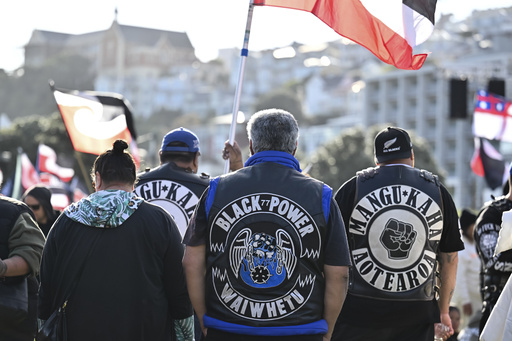
WELLINGTON, New Zealand — A new law prohibiting the display or wearing of gang symbols in public has been implemented in New Zealand, with the first arrest occurring just three minutes after its enactment on Thursday. According to Police Commissioner Richard Chambers, a man was detained after being seen with gang insignia on his car dashboard.
This law bans the public display of any gang insignia outside private residences, which includes wearables and items visible in vehicles. This restriction is part of a broader legislative package aimed at increasing police authority to counter gang activities. Offenders flaunting the insignia of one of the 35 identified gangs now face fines as high as 5,000 New Zealand dollars (approximately $2,940) or potential imprisonment for up to six months.
The center-right government of New Zealand, which campaigned on a promise to combat gang-related crime ahead of last October’s elections, believes that these measures will undermine the influence of groups notorious for violence and drug-related offenses. However, critics argue that this law infringes on civil liberties and risks pushing gang operations deeper underground.
Prime Minister Christopher Luxon expressed on social media on Thursday that gangs are detrimental to communities, stating, “Gangs aren’t community groups. They’re not a Rotary club… They thrive on destroying the lives of other New Zealanders, whether that’s by peddling drugs or through brutal acts of violence that leave communities in fear.”
In addition to the ban on symbolism, the legislation empowers police to disband public assemblies involving three or more gang members, restrict certain gang members from associating with each other, and search homes of repeat offenders for prohibited items. The courts will also factor in gang affiliation during the sentencing of various offenses.
Police Minister Mark Mitchell reported that not long after the law went into effect, two individuals were arrested for wearing gang “patches”—large insignias typically worn on the back of leather jackets or vests associated with gang membership. The government underlines that these patches can be intimidating as they must be earned through acts of violence.
This shift in policy towards gang visibility reflects a move towards approaches similar to those in neighboring Australia, which also enforces laws that suppress gang visibility, in contrast to countries like the United States and Britain, which handle organized crime through more conventional criminal law measures, as noted in a Treasury report from February.
Exempt from this new regulation are facial tattoos displaying gang symbols, as well as the wearing of gang colors. Some critics have pointed out the government’s omission of white supremacist groups from the list of 35 targeted organizations, maintaining that displaying swastikas and making Nazi salutes are still lawful in New Zealand—this stands in contrast to Australia, which enacted a law banning both earlier this year.
The New Zealand police maintain a list of nearly 9,400 known gang members within the nation’s population of 5 million. Different administrations have committed to tackling organized crime, which is often linked with socioeconomic disadvantages. Luxon’s administration has criticized the previous center-left government for collaborating with gangs on social programs, such as initiatives for COVID-19 vaccinations, while it has faced backlash for potential ramifications of policies that disproportionately affect marginalized communities, including Indigenous M?ori peoples.
Recent official statistics indicate that M?ori constitute roughly three-quarters of the individuals on the national gang list, despite making up less than 20% of the total population. Furthermore, it is reported that 80% to 90% of members from two prominent gangs were previously wards of the state. Recently, Luxon has publicly apologized for the extensive maltreatment of children and vulnerable adults during their time in state care over the past seventy years.
